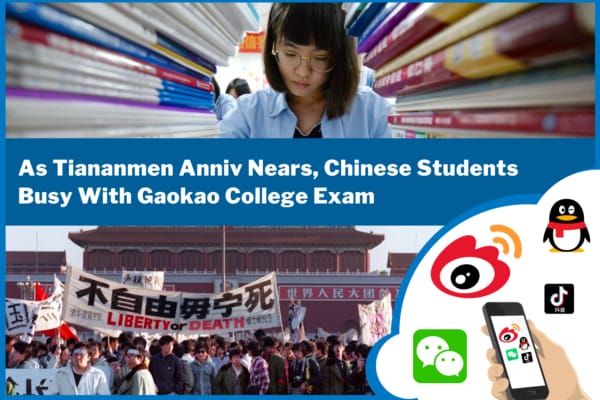To the world, June 4th 1989 is a day that is carved in infamy!
On this day, Chinese troops backed by tanks stormed into Tiananmen Square in Beijing to forcibly clear out thousands of students demanding democracy, freedom and human rights. Estimates of how many died in the massacre that followed vary from many hundreds to thousands.
For that very reason, the Chinese Communist Party and the government want to wipe out memories of that day, including banning mention of those protests in all media including social media. To this day, Tiananmen Square remains closely guarded, authorities keen to ensure no repetition of those protests that so divided the communist party.
A video posted on May 31 by a verified blogger on Weibo gives a sense of the stifling security that’s in place at the Tiananmen Square as the 1989 massacre anniversary nears.

It is virtually impossible for Chinese citizens to access any information about the massacre. No pictures or documentation is known to exist, if these do they are behind lock and key in the vaults of the Ministry of State Security. Photographs of Tiananmen Square available in the public domain are invariably of pre-1989 vintage, or present day. It seems the massacre has been wiped clean from public memory.
There’s another reason. Since 1978, June 7 and 8 are when nationwide college entrance exams, called Gaokao, are held. This is a hellish period, with nearly 13 million students sitting for the exams, vying to get into the nation’s top universities. Education in a good university is seen as the passport to a good job and competition is fierce. Parents are as involved as the students.
It suits the authorities perfectly. Check out this hashtag on Weibo: ‘#Only 5 Days Left Until 2023 Gaokao: The Countdown Begins!’
It has been trending on Weibo with over 50 million views since the morning of June 2, and will continue to trend till 8th June when the exam gets over. Weibo is China’s version of twitter and is entirely government controlled. So one can well ask if the 50 million figure is accurate or something the party and government media managers have manipulated.

Not only Weibo, People’s Daily, CCTV, CGTN, and many others will also be keeping the focus on the Gaokao Exam. They will also be extremely active on Chinese social media, where young people generally hang out. They will come out with motivational quotes, speeches from professors, details of universities, their courses and faculty, all of which will keep the public engaged.

For example, this post by CCTV on Weibo Says “On June 7th, the National College Entrance Examination (Gaokao) will begin, and 12.91 million candidates will step into the examination halls. The lights in the teaching buildings will be bright, and students will be studying late into the night. Inspirational slogans will be hanging on the walls, and teachers will set up desks in the corridors to answer questions and provide guidance.” Rely on CCTV to upload images of students studying hard.

The purpose is to maintain a rigorous academic environment, promote a sense of national unity and loyalty among the younger generation. It reinforces the party’s narrative that dedication to education and personal advancement is the key to the country’s prosperity, overshadowing any grievances or questions related to past events.
This has significant implications for the youth in China. It not only restricts their access to historical knowledge and critical thinking but also limits their ability to engage in discussions about political reforms and social justice. The focus on exam preparation reinforces the CCP’s narrative and discourages independent thought or dissenting opinions among the younger generation.
The CCP wants to mould a generation of youth who are compliant and loyal to the party’s agenda. However, despite these efforts, the memory of Tiananmen Square and the desire for political reform still persist among some individuals who seek to keep the truth alive and work towards a more open and democratic China.
















